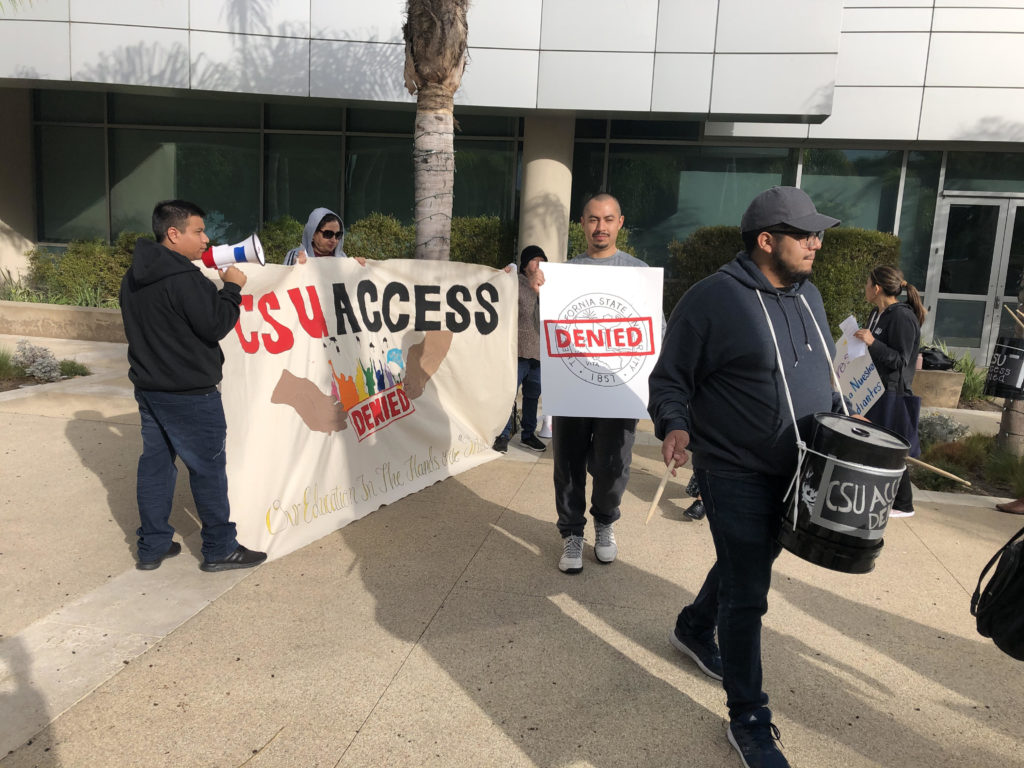California State University leaders signaled Wednesday they will move forward with a controversial plan to require a fourth year of high school math or another quantitative reasoning class for freshman admissions — despite opposition from civil rights organizations, education groups and state leaders.
During a CSU trustee meeting Wednesday at the system’s headquarters in Long Beach, opponents reiterated concerns they have voiced for months: that CSU has not provided sufficient evidence showing the change is necessary to improve student achievement and that the change would make it harder for black, Latino and low-income students to attend the 23-campus CSU.
Among those who criticized the proposal Wednesday were Lieutenant Governor Eleni Kounalakis, State Superintendent of Public Instruction Tony Thurmond and representatives from the California Faculty Association, the Los Angeles Unified School District and leading advocacy groups, such as the Campaign for College Opportunity and The Education Trust-West.
Those critics asked trustees to further delay a vote on the proposal, originally scheduled for Wednesday and now expected in January.
But outgoing CSU Chancellor Timothy White said the change is a necessary step for the nation’s largest four-year public university system, saying that the “nature of work in the future will require more quantitative reasoning.”
“We want underserved students to be competitive in the future of work,” he said. “There are numerous safety valves in this proposal to ensure it is not going to be hurtful to a single student. We need to have the courage to give the support to these young men and women to be competitive in the workplace of tomorrow.”
Under the proposal, CSU would require freshman applicants to take a fourth year of high school math or a quantitative reasoning class, such as computer science or personal finance.
CSU made minor changes to the proposal ahead of Wednesday’s meeting, including delaying the planned implementation from 2026 to 2027 and adding an automatic exemption waiver for students who attend schools that don’t offer the required courses. Previous versions of the plan would have required students to seek the exemption on their own.
Opponents on Wednesday dismissed those amendments as insufficient.
“These changes don’t address the significant concerns that we have raised. It’s kind of like trying to fix something that’s completely broken by doing a tweak here or there,” Michele Siqueiros, president of the Campaign for College Opportunity, told EdSource.
Siqueiros joined other critics in calling on trustees to wait to vote on the proposal until they conduct a more thorough analysis detailing the potential impact of the change.
CSU administrators have said that by requiring a fourth year of high school math students will come to college better prepared and their completion rates will improve.
Kounalakis, the lieutenant governor, said CSU’s rationale for the change does “not add up” and doesn’t “create a foundation for such a dramatic change.” She encouraged trustees to reject the proposal and pointed to CSU data showing that 93 percent of students already enter the system with four years of high school math.
“Adding a fourth year of quantitative reasoning is not going to impact significantly our graduation rates if 93 percent of the students are already coming in with a fourth year,” she said. “I would encourage the members not to support the implementation of a new requirement that is beyond what is required even in the [University of California] system that would impact largely those students who are coming from communities where they are already at a disadvantage.”
Activists have said many schools lack the teachers to offer the courses that would be required under the proposal and that those schools overwhelmingly enroll black, Latino and low-income students. CSU officials have denied that charge, saying that more than 99 percent of California high schools offer at least one course that would satisfy the proposal.
The 74 reported Monday that fewer than 25 percent of seniors at LA Unified in the 2018-19 school year took a math or quantitative reasoning course, the type of course that would be required under the CSU proposal. Under the current CSU admission requirements, 46 percent of graduating LA Unified students were eligible in 2018-19, according to district data. About three-quarters of LA Unified students are Latino and more than 80 percent qualify for free- or reduced-price meals.
Elisha Smith Arrillaga, executive director of The Education Trust-West, said in an interview with EdSource that the report from The 74 is further evidence that the proposal is a “threat to equity.”
Maria Linares, a student at Cal State Fullerton, said she struggled to gain admission to Fullerton under the math requirements already in place — CSU currently requires three years of high school math — and fears that the new proposal will prevent students like her from attending CSU.
“With this quantitative reasoning proposal, you would knowingly be adding barriers for people from underrepresented communities,” Linares added.
Peter Taylor, chair of the Committee on Educational Policy, which is taking up the proposal, indicated during Wednesday’s meeting that the committee plans to move forward as scheduled in January with a vote.
“This will not linger on forever. … We are going to get to a point where I promise we will make a decision one way or another,” he said.
To get more reports like this one, click here to sign up for EdSource’s no-cost daily email on latest developments in education.
